"These products don't look like they've been made by people living on the street" - Pepe Heykoop
Milan 2014: a product designed by Dutch designer Pepe Heykoop to be made in an Indian slum has been a runaway success, creating employment for 80 families within a year of launch (+ movie + interview).
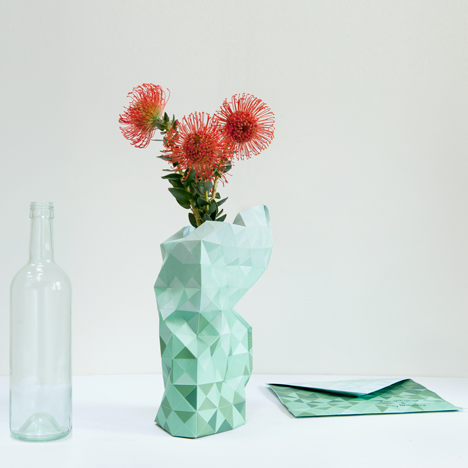
Speaking to Dezeen in Milan last week, Heykoop said workers making his Paper Vase earned the equivalent of eight Euros per day, which is eight times the average wage in the Mumbai slum.
"The ambition is to have 700 people out of poverty in ten years time," said Heykoop. "We are pretty much half way".
Initially launched in February last year, Heykoop presented the vase at Ventura Lambrate in Milan this year along with a range of other products he designed as part of a project organised by charity the Tiny Miracles Foundation to lift people out of poverty in Mumbai.
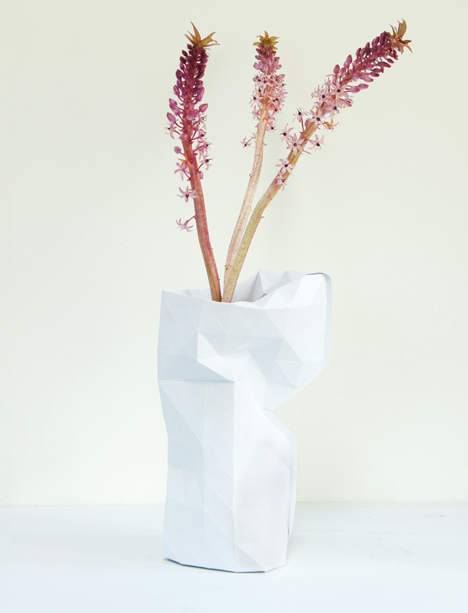
Online orders for the vase are averaging around 100 per day, allowing the foundation to keep 80 families in regular employment.
However the other products proved unsuitable to the project, which struggled for the first couple of years.
"In 2012 we never thought this was actually happening and now there's light at the end of the tunnel and there's a really good vibe going," Heykoop said.
The success of the flat-pack vase – which is made of paper and sewn together – has led Heykoop to develop another folded paper product. Prototypes of his flatpack Paper Lamp were on show at Ventura Lambrate.
"The paper vase was the breakthrough and for 2014 I have this paper folded light, which has the same principal and has been flat-packed in an envelope," said Heykoop.
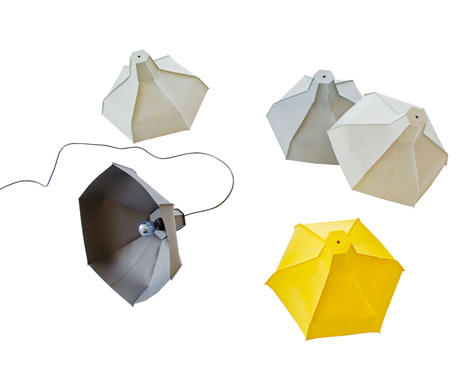
After they're made, the products are shipped from Mumbai to Heykoop's studio in Amsterdam then distributed to consumers worldwide. However, if the buyers live east of India then the designs are shipped straight from there to save them travelling all the way around the world.
The Tiny Miracles Foundation, set up in 2010, is half way towards its goal for 2020 to provide 150 families with a wage of ten euros a day – the UNICEF standard for a middle class wage – in return for their production skills.
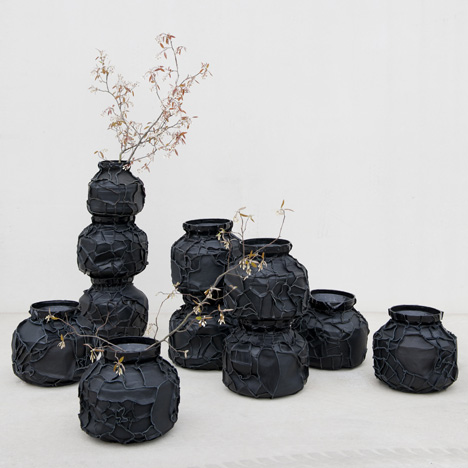
Heykoop's original ideas for the project were lampshades from lambskin, transforming traditional water carriers into leathery vases, but the products proved difficult for the community to produce and too expensive for consumers to purchase.
"I started off with leather lampshades; they're like 550 Euros in the shop," he said. "It's nice when you sell a bunch of them but you have work and then you don't have work for a few weeks. These ladies were coming to me and asking 'can I work next month', and I wanted to say yes but I couldn't, because the products were not selling on a daily basis."
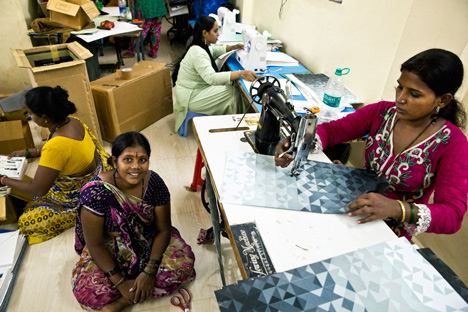
Heykoop hopes to train the families in Mumbai to manage the distribution themselves, so the process becomes contained within the community after the programme finishes in six years time.
"This foundation stops in 2020 but it doesn't mean that this workshop stops in 2020," Heykoop explained. "If we stop the workshop in 2020, it will all collapse again. If the foundation stops providing the information, then they should be self sustainable."
Here's an edited transcript of the interview with Pepe Heykoop:
Marcus Fairs: Tell us about the project that you're showing in Milan.
Pepe Heykoop: I've been a collaborator for four years with Tiny Miracles Foundation, which has been set up by my cousin. This community group that we're aiming at lives in a slum in Mumbai and they used to be basketry weavers. They earned one euro a day for the whole family.
Most of them were illiterate, couldn't count to ten it was like hardcore surviving on the streets. Then my cousin started the foundation and she asked me: "Pepe can you design some items that we can produce with them because we want to bring education, we want to bring healthcare but we also want to provide jobs so they can eventually pay for the healthcare and education themselves."
So I went there and for me it was the second time in India, and it's such a different world. When I started designing things, it was really heard to blend in with their way of thinking and their world and my world. It took two and a half years to find something that really worked.
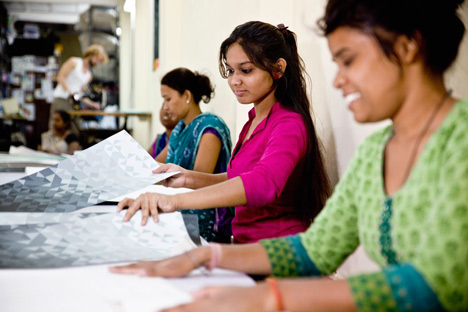
Marcus Fairs: What's the ambition of the Tiny Miracles Foundation? To employ people?
Pepe Heykoop: The ambition is to have 700 people out of poverty in ten years time. I'm only working on the creating jobs pillar and Laurien [Meuter] was taking care of the healthcare and education, other pillars.
Marcus Fairs: So the idea was for you to come up with some products that they could manufacture?
Pepe Heykoop: Well all of them can do basketry weaving with their eyes closed but I said I don't want to do something with weaving or bamboo, because it has this ethnic look and this fair-trade image and I think we should focus on something new. That a product should sell itself. You want it because you like it, you buy it and then the story is a plus, an extra.
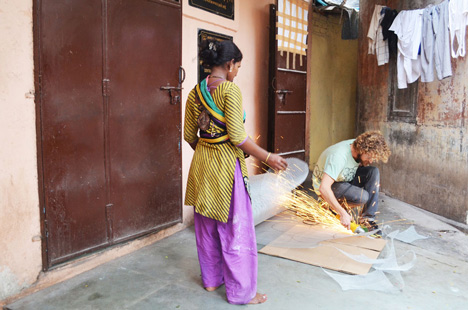
Marcus Fairs: You don't buy it because you feel guilty, or feel sorry for people.
Pepe Heykoop: No, there's a lot of good initiatives. You want to support them and then you get an ugly basket, you know what I mean. So these products don't look like they've been made by these people living on the street and that's where I wanted to go.
But it's hard. It's hard when people cannot count to ten to work with them but luckily there was this force within me to not give up and act like a pit bull, hanging on. We found something with the folded paper vase covering to be put around an empty bottle and shipped in an envelope. It comes as a gift and it works out really well. We've sold like 100 pieces a day at the moment and that's why now, starting off with seven people in 2011, now we have over 80 people employed in 2014. We'e heading towards a goal of a group of 700 people, equal to about 150 families.
Marcus Fairs: So that's the target?
Pepe Heykoop: This is half way. The project takes until 2020, so in four years we are pretty much halfway. In 2012 we never thought this was actually happening and now there's light at the end of the tunnel and there's a really good vibe going on since about one and a half years ago.
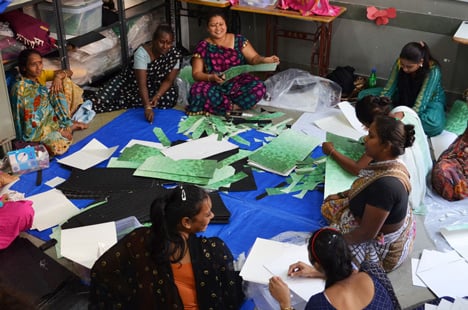
Marcus Fairs: Tell us briefly about the other two products.
Pepe Heykoop: The paper vase was the breakthrough and for 2014 I have this paper folded light, which has the same principal and has been flat packed in an envelope. The weight's really low.
These samples I've been making during the last week in the studio are prototypes, and I'm testing colours now and colours of the treads and we'll see which one it's going to be. This paper should be coated and then within three seconds you just pop it up and there's a certain tension in the paper, which gives it shape. So then we're going to sell this separately, the electricity and separately the shade, if you want to change it for a different colour.
It should also be a low price range. The Paper Vase is 19 euros in the shop and this one we want to have 35, 39 euros for the other. Everybody can buy it, because that's the only way we can have these women working on a daily basis.
I started off with leather lampshades; they're like 550 euros in the shop. It's nice when you sell a bunch of them but you have work and then you don't have work for a few weeks and then there's work and then there's not work. These ladies were coming to me and asking "can I work next month", and I wanted to say yes but I couldn't, because the products were not selling on a daily basis.
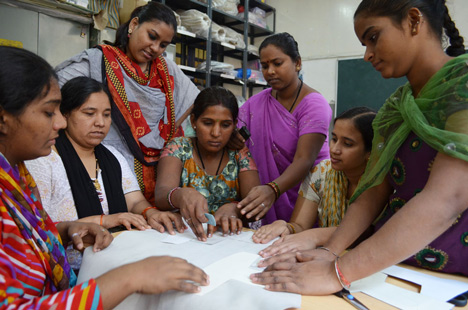
Marcus Fairs: So what techniques do they use to manufacture these?
Pepe Heykoop: There's paper and sewing. Actually I started off in 2011 with the welding and way too complex techniques, and I had failure after failure. Then at a certain moment, I said I'll get a folding class and I invited 30 women to come and fold a sheet of paper in half. None of them could do this correctly and then I was shocked because I thought "this is the final try" if folding a sheet of paper doesn't work.
So then of course after some training, I made something like a game out of it, because I want this workshop to have a really positive vibe and I hate production in China where you're not allowed to see how stuff is done. If you know where your T-shirt is coming from in these factories in Bangladesh, you don't want to wear it. So I said we can do, of course we can do production in such a nice way as I can do it in Amsterdam. We can do it there as well and we don't just take something but we also give something back. That's the whole.
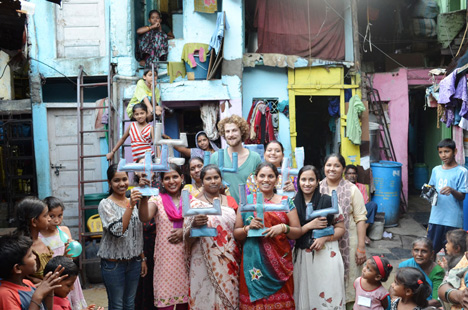
Marcus Fairs: Do they work from home or is there a workshop they go to?
Pepe Heykoop: We started off with a really dark crappy spot near the street; there were rats running round and cockroaches and rain was coming in, but you should start from something. Then in 2012, we changed into a bigger room and now we have a big room, a proper room that's clean and light. There's no rain coming in.
Marcus Fairs: And you said that people get paid to eat, one euro a day. Do you pay them the same, or do you pay them more than the average?
Pepe Heykoop: No no no, they used to earn one euro a day with basketry weaving for the whole family and we go up to ten euros a day, which is the UNICEF standard for middle class. Now it's eight euros but by 2020, it will be something around ten. If you increase the salary ten times more, you will only ruin the system over there because they will hate each other; who can work with us and who can't. So we integrate this amount in education and doctor visits. So now behind the scenes we are paying that and every year they should pay 10 percent more for education and doctor visits. So within ten years, they are paying this themselves gradually.
Marcus Fairs: And finally, do they make the products and also ship the products to the customers, or do they put them in a big crate and send them to you in the Netherlands and then you do it from there?
Pepe Heykoop: For the moment, we have everything sent to Holland. Except for orders that go to Japan or Australia, like the other way round, then we ship them directly. But it involves a lot of training, because there should be final checks, so we do some final checking in Holland but we want to train them to do that.
This foundation stops in 2020 but it doesn't mean that this workshop stops in 2020. So the foundation helps with understanding how it works, with the doctor visits and the schooling and whenever they make the money. If we stop the workshop in 2020, it will all collapse again. If the foundation stops providing the information, then they should be self sustainable.